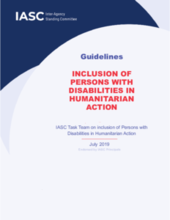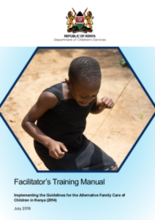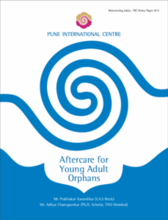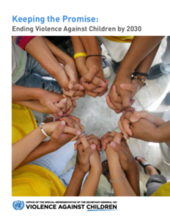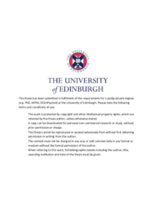Demographic Data
|
Sources: World Bank, UNDP, UNAIDS, DHS 2013 |
Displaying 5961 - 5970 of 14395
The National Executive Committee of the South African National Association of Child Care Workers(NACCW) and the Board of Governors of CYC-Net have announced details of the 22nd NACCW Biennial Conference and the 4th CYC-Net World Conference to be held in Durban, South Africa from 2-4 July 2019.
The guidelines set out essential actions that humanitarian actors must take in order to effectively identify and respond to the needs and rights of persons with disabilities who are most at risk of being left behind in humanitarian settings.
Kenya's Department of Children’s Services (DCS), and its care reform partners within government and civil society, developed this Facilitator’s Training Manual for training on implementing the Guidelines for the Alternative Family Care of Children with the intent to streamline and standardize alternative family care services in Kenya through standardized training. This comprehensive training package includes the training facilitator’s manual, PowerPoint presentations, handouts, case studies, and video clips.
This situation analysis explores multidimensional poverty in Uganda, including an examination of both material and social needs of children – including health care and education, a social and family life, clean and safe drinking water, housing that is not squalid and overcrowded, adequate clothing, and regular meals with sufficient and nutritious food.
With this guide, the Global Initiative to End All Corporal Punishment of Children aims to support governments and civil society working to end violence against children through effective prohibition of corporal punishment.
This paper attempts to recommend a suitable policy framework of aftercare services for Young Adult Orphans (YAOs) in India, with special reference to the state of Maharashtra.
This report from the Office of the Special Representative of the Secretary-General on Violence against Children outlines the impacts of violence against children and proposes recommendations for safeguarding the right of every child to protection from all forms of violence.
This collection of resources from UNICEF includes a call to action, policy brief, and evidence briefs focused on investing in family-friendly policies in the workplace.
This thesis paper explores (1) how children in care in the UK are making use of mobile communication devices for contact with members of their familial and friendship networks; (2) to what extent devices like the smartphone, tablets and computers either improve or hinder communication; and (3) how contact using mobile communication devices and Internet is being managed by foster carers and social workers.
This report presents policy recommendations to improve the U.S. child welfare system, made by young adult interns who participated in the Foster Youth Internship Program® (FYI), "a highly esteemed congressional internship for young adults who have spent their formative years in U.S. foster care."

